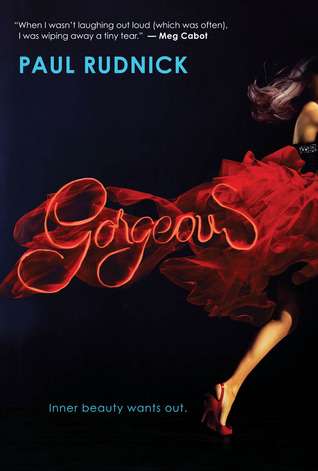Gorgeous
Paul Rudnick
Paul Rudnick’s birthday was last week. Had I not been doing some LitStack literary birthday research, I probably would never have read this book. I had heard of Mr. Rudnick as a  playwright, but didn’t know much of his work beyond reputation, but when writing the little blurb for his birthday, I decided I wanted to know more about him.
playwright, but didn’t know much of his work beyond reputation, but when writing the little blurb for his birthday, I decided I wanted to know more about him.
I found Gorgeous to be a fun, somewhat charming Cinderella-esque story. Yes, there were some mighty big gaps in credibility, but then, fairy godmothers (even those in the guise of reclusive celebrity fashion designers) are few and far between in real life, anyway.
Gorgeous is the story of eighteen year old Becky Randall who, as a final wish from her dying trailer trash (or so she thought) mother, is given a magical choice: accept a plane ticket and stipend to take a mysterious trip to New York, or return to her dead-end job as cashier at a local supermarket in East Trawley, Missouri. When she gets to New York (because it would be an awfully short story had she said no), she is whisked away to a world of glamour and wealth, and given another choice: if she wears three dresses made just for her from mega-famous designer Tom Kelly, she will be transformed into The Most Beautiful Woman in the World.
Yes, it’s magic. Becky isn’t a slouch, but she’s nowhere near gorgeous, and never will be, on her own. But there’s a catch: she has to fall in love and marry within a year, or she reverts back to her original form and her original life in her now empty mobile home in East Trawley, Missouri. And it has to be true love, not this marriage-for-marriage-sake things.
What ensues is a fairly typical story full of shenanigans, soul searching, and trying to find the high ground in accepting that yes, being adored and fawned over is desirable. What’s different about Gorgeous is that Becky – or Rebecca, as she is known as during her transformation – is a fairly well grounded smart ass, who nevertheless does possess a good (but not fairy tale good) heart. She truly loved her mother, and her strongest impulse in going along with the madness is so she can better understand the person her mother was. When the crisis comes along (which it always does in these morality-tale tales), the choice is not whether she will remain Becky or Rebecca, but whether truth is more valuable than beauty. That’s not the easiest of calls to make, when the stakes are high.
Gorgeous is marketed as a Young Adult book, but I would argue with that. The language is pretty raw for a YA book – a higher degree of profanity than was called for; realistic, perhaps, but if so, the only thing in the book that could be there simply for the sake of reality. And there was no tie to “real life” beyond the broadest questions of value and being true to oneself. The situations that Becky/Rebecca finds herself in are in not believable or relatable. But then – I got the feeling that being believable was not a big factor in the writing of this book.
Actually Gorgeous feels like a stage play. Its situations are compact and slapstick, full of declaration and effects built around one person. And huge amounts of really witty, fun dialog. Yes, there are huge vistas at times, and a whole cast of supporting characters, but any unease I had at reading the fairy tale aspect of the story poofed when I imagined the action taking place on stage. Perhaps because of the accepted “willing suspension of disbelief” that is given carte blanche for a stage performance but must be sculpted and crafted more carefully in a book?
Regardless, Gorgeous is a fun diversion. Certainly, not a literary epic, but if you need a fun and snappy entertainment to escape into for a while, Gorgeous will easily fit the (play)bill.

